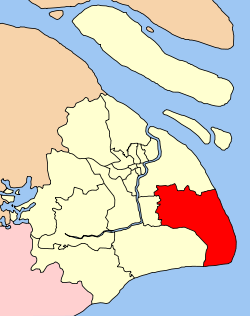Nanhui District
| Nanhui 南汇区 |
|||||
| District of China | |||||
|
|||||
| Location of Nanhui on Shanghai. | |||||
| History | |||||
| • | Established | 2001 | |||
| • | Disestablished | 2009 | |||
| Today part of | Pudong New Area | ||||
Nanhui District (simplified Chinese: 南汇区; traditional Chinese: 南匯區; pinyin: Nánhuì Qū), formerly romanized as Nanhwei, was a district of Shanghai until it was merged into Pudong New Area in May 2009. It had a land area of about 809.5 km² and a 59.5-kilometer coastline. The population of Nanhui was 975,017 as of August 2006. On May 6, 2009, it was announced that the State Council of China had approved the proposal to merge Nanhui District into Pudong, which is also a district of Shanghai.
About 2000 years ago, the water of the Yangtze River ran to the south because of sea tide and met the Qiantang River so as to form the land near Tang dynasty, so this district was named by Nanhuizui (Nan is South, Hui means converge, and Zui means mouth in Chinese).
In 2001, Nanhui County was renamed Nanhui District. In May 2009 Nanhui was merged into Pudong New Area.
Nanhui's GDP in 2006 is about 4.5 billion USD. Per Capita Annual Total Income and Net Income of Rural Households is a bit more than 1000USD.Public finance-revenue is about 1.38 billion USD. In the past, Nanhui got the good rank in Public finance-revenue (the Top 10 of rich county in China). Foreign exchange through exports is about 1.88 billion USD.
Nanhui District is now special in developing the Yangshan international deep-water port in the southeast and Pudong International Airport in the northeast. Yangshan deep-water port is a new port in Shanghai. It is connected the Lingang New City with the East China Sea Bridge. It can help Shanghai become the Top 1 harbour city in the world. With the development of Yangshan port and Pudong airport, Nanhui District is developing very fast. Recently the center of Nanhui district enlarge its area to catch up with the development of Shanghai. Huanglu Town has been incorporated into the center of Nanhui.
...
Wikipedia

